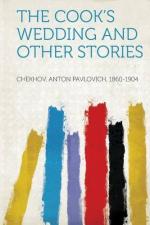“Papa, what does ‘oysters’ mean?” I asked in a husky voice, making an effort to turn my face towards my father.
My father did not hear. He was keeping a watch on the movements of the crowd, and following every passer-by with his eyes. . . . From his eyes I saw that he wanted to say something to the passers-by, but the fatal word hung like a heavy weight on his trembling lips and could not be flung off. He even took a step after one passer-by and touched him on the sleeve, but when he turned round, he said, “I beg your pardon,” was overcome with confusion, and staggered back.
“Papa, what does ‘oysters’ mean?” I repeated.
“It is an animal . . . that lives in the sea.”
I instantly pictured to myself this unknown marine animal. . . . I thought it must be something midway between a fish and a crab. As it was from the sea they made of it, of course, a very nice hot fish soup with savoury pepper and laurel leaves, or broth with vinegar and fricassee of fish and cabbage, or crayfish sauce, or served it cold with horse-radish. . . . I vividly imagined it being brought from the market, quickly cleaned, quickly put in the pot, quickly, quickly, for everyone was hungry . . . awfully hungry! From the kitchen rose the smell of hot fish and crayfish soup.
I felt that this smell was tickling my palate and nostrils, that it was gradually taking possession of my whole body. . . . The restaurant, my father, the white placard, my sleeves were all smelling of it, smelling so strongly that I began to chew. I moved my jaws and swallowed as though I really had a piece of this marine animal in my mouth . . .
My legs gave way from the blissful sensation I was feeling, and I clutched at my father’s arm to keep myself from falling, and leant against his wet summer overcoat. My father was trembling and shivering. He was cold . . .
“Papa, are oysters a Lenten dish?” I asked.
“They are eaten alive . . .” said my father. “They are in shells like tortoises, but . . . in two halves.”
The delicious smell instantly left off affecting me, and the illusion vanished. . . . Now I understood it all!
“How nasty,” I whispered, “how nasty!”
So that’s what “oysters” meant! I imagined to myself a creature like a frog. A frog sitting in a shell, peeping out from it with big, glittering eyes, and moving its revolting jaws. I imagined this creature in a shell with claws, glittering eyes, and a slimy skin, being brought from the market. . . . The children would all hide while the cook, frowning with an air of disgust, would take the creature by its claw, put it on a plate, and carry it into the dining-room. The grown-ups would take it and eat it, eat it alive with its eyes, its teeth, its legs! While it squeaked and tried to bite their lips. . . .




